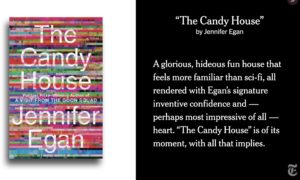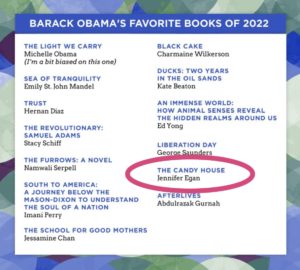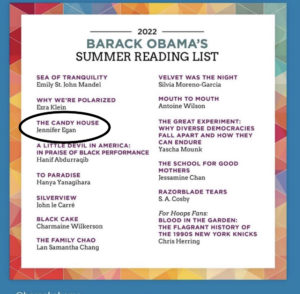The New York Times Book Review: TOP 10 Books of 2022!!!
New York Times critic Dwight Garner’s 3 Favorite Novels of 2022
“It’s about technology, about stabs at a collective consciousness, but it’s got a vastly human soul.”
PBS News Hour: 12 Books to Read from 2022
“It is grappling with what it means to be hooked into technology and social media.”
“The effect is even more dazzling than in Goon Squad, a tribute to fiction’s power to access truths that mere information can never convey.”
Philadelphia Inquirer: Top 10 Books of 2022
“When it’s brilliant, they call it speculative fiction.”
The Economist: Top 6 Fiction of 2022 (behind paywall)
“A novel about what humans lose in offering up their private lives to algorithms that mine them for profit…a kind of 21st-century Middlemarch”
Entertainment Weekly: 10 Best Books of 2022
“The novel — with its prismatic plotting and ever-shifting chorus of seekers, kooks, and visionaries — feels less like a house than a honeycomb full of fantastical rooms, each one alive and thrumming with bright, weird humanity.”
Kirkus Editor-in-Chief’s Top 6 Books of 2022
“Such inventiveness, intelligence, and style! This one left me breathless as it explored themes of memory, privacy, family, and more with pure storytelling brio.”
Hollywood Reporter: 10 Best Books of 2022
“Egan’s latest is a beautiful reminder that the literary world has not fallen prey to Hollywood’s existing-IP creative drought.”
“After her fiercely spectacular A Visit From the Goon Squad, the odds seemed slim Jennifer Egan could do it again—and yet, she did.”
Mental Floss’s 16 Best Books of 2022
“Following up 2010’s Pulitzer Prize-winner A Visit From the Goon Squad was a tall order, but Jennifer Egan succeeds in spades with her sort-of sequel The Candy House.”
Library Journal: 10 Best Literary Fiction of 2022


